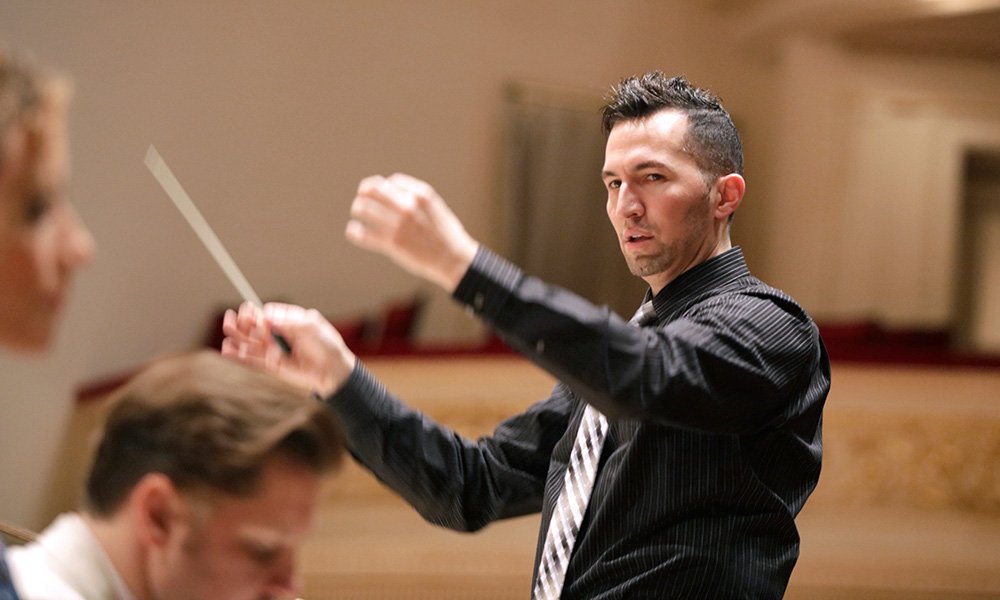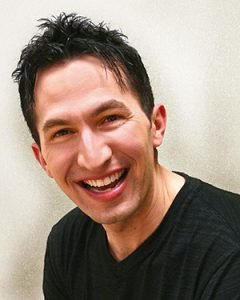 Photo by Paul LaRaia.
Photo by Paul LaRaia. Glasgow, a 2007 graduate of Concordia University Wisconsin’s Master of Church Music program, will debut the new composition for chorus and orchestra as part of a concert with the New England Symphonic Ensemble on June 20, 2022.
Given its historic place in America musical performance, it’s always special to perform at Carnegie Hall. It’s even more so when that performance is the world premiere of your own work. When it’s all finally happening after being delayed by a global pandemic? Well, that just raises things to a whole new level.
That’s how CUW alum Michael J. Glasgow (’07) feels about the debut of his new Gloria for chorus and orchestra, which he will conduct at Carnegie Hall in New York City on June 20.
“You can only do a work for the first time, one time,” Glasgow says. “The uncertainty of this pandemic has really made it all feel extra special. We’re praying that everything goes well, everyone stays healthy, and that we have a concert that’s safe, artistically successful, and also God-glorifying.”
A milestone performance
In addition to the orchestra, the ensemble at Carnegie Hall will include an 82-voice chorus, comprising singers selected by Glasgow and hailing from 15 different states. The work will feature two soloists: soprano Haley Sicking and baritone Erik Earl Larson.
The origins of Glasgow’s Gloria date back to November 30, 2018, when the composer wrote what he called “a nugget of a glimmer” of a new piece. He wasn’t sure what would become of it at the time, but he recognized the bits of music as the start of something much more significant. “It was like, ‘When I write a Gloria, this is going to be the material that bookends the second movement.”
Glasgow started working on a complete composition, with an invitation to perform it in New York in June 2021, when Covid-19 put the world on hold. Time to write became scarce, as he poured most of his energies into his full-time job as a church musician, helping get video worship up and running, along with other unexpected pandemic-response measures.
“It really just consumed everything,” he explains. “And then when I did have time to write again, the muse had kind of disappeared. I felt so depressed and disheartened, I just didn’t have any energy to write.”
When the pandemic started to turn the corner last year, Glasgow left his position at North Raleigh (N.C.) United Methodist Church (where he’d served since 1998) to focus on composing and writing full time. The move, along with a renewed invitation to debut the Gloria this year, served to provide new inspiration and joy, he says.
“I think that that distance gave me a different kind of inspiration and perspective to complete the work, ultimately making it even stronger than it would have been had it been done a year before.”
It’s just like his mother always told him, “Show me any bad situation you’ve encountered in life, any challenge, and I will show you how God used it for good, and used it for a blessing.”
“I’ve always taken those words to heart,” he says, “and I think that’s just what happened here.”
Matching the message
One thing that’s long been important to Glasgow is that the music he writes should match the mood and the message of what the text is saying.
“I’ve taken care to ensure that this Gloria actually sounds like what it says,” he explains. “The first movement is one of jubilant praise and faith; the second movement is a quiet prayer; and the final movement is an explosive celebration of mixed meter, syncopation, and cross-rhythms, culminating in ecstatic Amens that I envisioned as an amazing party that you don’t want to leave.”
This focus on making sure the notes and the words are sending the same message is a concept that was reinforced for him during his time at Concordia.
He tells of an experience in one of his very first classes, in which Dr. Ken Kosche, a retired professor of music, played a few bars from a noted Kyrie (a piece of sacred music that beseeches “Lord, have mercy”) and asked “How ‘kyrie’ is this Kyrie?” It’s a question that stuck in Glasgow’s mind and has guided his composition of sacred music ever since.
“I immediately latched onto this concept,” Glasgow says, “because I had been trying to find a way to express that idea myself: When there is a text to be conveyed, the music has to embody the message and the spirit of that text.”
God’s plan, not man’s
After beginning what he thought was going to be a career in journalism or possibly advertising (he graduated from the College of Charleston (S.C.) with B.A. degrees in both music theory/composition and journalism), he took a job as Minister of Music at a small church in Raleigh, N.C., thinking, “this will do until something better comes along.”
God’s plan was different; Glasgow stayed there more than 23 years.
“It was after I started working there that I realized this was my calling,” he explains. “I didn’t go into ministry because I was called to it; it was honestly going to be ‘just a job.’ But I realized, no, you’ve been led here and you’ve got things to do that God wants you to do here.
“That’s a special thing, and I pray that more people will experience that kind of calling to ministry.”
He said he didn’t have much interest in pursuing a master’s degree until he found a program that felt meaningful enough. When he learned about the Master of Church Music program at Concordia, he felt it was just the right fit. After three summers of concentrated study, he graduated summa cum laude with a double emphasis in both choral and handbell music.
He’s been a generous supporter of Concordia ever since, donating in particular to CUW’s Adopt-a-Student Scholarship program.
Soli Deo Gloria

To sum it all up, that’s how you get to Carnegie Hall. But this upcoming performance won’t be Glasgow’s first appearance on the legendary Perelman Stage. He conducted his Requiem there in 2017, on what just happened to be a significant birthday. “There are worse ways to turn 40 than to make your Carnegie Hall conducting debut!” he says.
Following the European premiere of his Requiem in 2019, Glasgow was named a “Distinguished Composer & Conductor” by MidAmerica Productions, the organization presenting this concert.
In addition to working as a full-service freelance composer, conductor and teacher, Glasgow serves as the Bass Section Leader for the North Carolina Master Chorale. A passionate composer with an “abundant melodic gift” (New York Concert Review), he keeps busy on his own projects, has fulfilled more than 40 commissions, and has been honored by several contests for organ, handbell, and choral compositions.
“It’s been a bumpy ride over the last year-and-a-half, with the pandemic,” Glasgow reflects. “But Carnegie Hall is such an amazing place, and it really is a joy to be a part of something there. I have no doubt that the Holy Spirit will be working.”
More information and samples of Glasgow’s work may be found at michaeljglasgow.com, and on Twitter and YouTube: @MichaelJGlasgow.
For more information on music programs at Concordia University Wisconsin, visit the Department of Music at cuw.edu.
— This story is written by Mike Zimmerman, corporate communications manager for Concordia University Wisconsin. He may be reached at michael.zimmerman@cuw.edu or 262-243-4380.
If this story has inspired you, why not explore how you can help further Concordia's mission through giving.